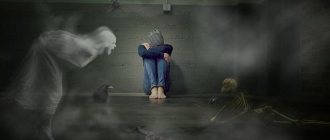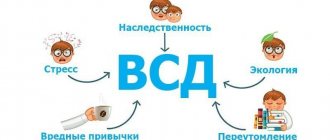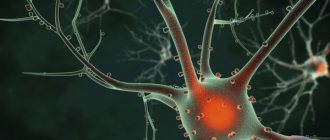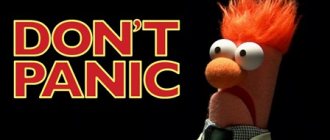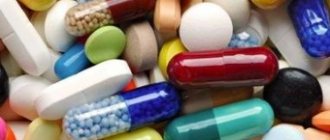Extrasystole: why you can’t trust information on the Internet regarding its symptoms
Often people who feel the symptoms of extrasystole make a serious mistake: instead of immediately contacting a specialist (cardiologist, psychologist, psychotherapist), they start looking for information on the Internet, trying to find out what extrasystole , what is happening to them and how dangerous it is. They browse a huge number of medical sites and forums, receiving a barrage of completely unnecessary and often completely harmful information - and thereby only worsen their condition. So reading medical articles, communicating on forums and communities more often do harm than good. Why?
Firstly, the symptoms of extrasystole are discussed by unknown people, citing unreliable sources, many of which were either written by amateurs or are long outdated.
Secondly, websites and forums are often written by illiterate people who, although not on purpose, misinform readers.
Thirdly, people who really have heart problems come there: organic lesions, other forms of arrhythmia, etc. They communicate with people whose extrasystole is purely functional in nature, that is, it is just a psychological problem, and there are no pathological changes in the heart. As a result of such communication, a person with symptoms of extrasystole increases anxiety and fears of dying from heart disease, when in fact his heart is absolutely healthy.
Say no to forums and medical sites
Receiving a bunch of unnecessary and useless information, a person begins to limit himself physically, he develops a fear of extrasystole and develops cardiophobia. But if a person really wants to get rid of the fear of extrasystole , which is actually safe, he needs to avoid visiting any medical sites. Everyone. Even those where there are good cardiologists who confirm that extrasystole is, in principle, safe. It is enough to download a couple of articles where good cardiologists say that it is safe, and that’s all. And constantly visiting medical sites will lead to a person misinterpreting the information that is presented there, because he is not a cardiologist.
The same applies to forums dedicated to VSD. If you go to any of them and find a topic about extrasystole , you can read a lot of stories written by different people who are far from medicine. Moreover, all these stories are filled with complaints and do not contain any valuable information. Sometimes people on such forums write sheer nonsense, and a person, instead of finding ways to solve his problem, begins to get confused and scared.
Types of extrasystole
Extrasystole is classified according to the location of the abnormal focus of activity:
- ventricular;
- ventricular-atrial;
- atrial.
Due to the occurrence:
- extrasystole of functional origin - as a result of the use of nicotine, alcohol, nervous overstrain;
- extrasystole of organic origin - myocardial infarction, cardiomyopathy, heart defects, coronary heart disease;
- extrasystole of toxic origin - as a result of the use of certain medications, during a prolonged febrile state.
Also distinguished:
- bigeminy - characterized by the occurrence of extrasystole immediately after a normal contraction;
- trigeminy - one normal contraction is followed by two extrasystoles, or two normal cardiac complexes are followed by one extrasystole;
- quadrigeminy - three normal contractions occur, followed by an extraordinary contraction.
The problem is not in the extrasystoles themselves, but in the attitude towards them
of extrasystole during the day . Of course, this scared him. The main thing here is to understand that if a person does not have organic damage to the heart muscle, but has neurosis or some kind of exhaustion, then the problem is not in extrasystoles. Because there are people who have 30 thousand extrasystoles a day, but they don’t feel them and live normally. Moreover, almost all people have extrasystoles; they can be detected using a holder - an electrocardiogram device that reads information throughout the day. So the problem is not in the extrasystole , but in the attitude towards it.
What cardiologists write about extrasystole
Cardiologist Eduard Romanovich Guglin:
“ Extrasystole is the most common and most harmless form of heart rhythm disturbance. Extrasystole is a manifestation of increased excitability of the heart muscle. Most often these are functional changes, but we do not find organic changes. And the heart, despite sometimes many years of extrasystole, remains healthy. This type of arrhythmia does not shorten life or increase the risk of other diseases or death. She's harmless enough. And the drugs that we use with greater or less success to suppress it, to reduce its frequency, are themselves quite toxic compounds.
As a result of large studies, it has been repeatedly established that suppressing extrasystole with antiarrhythmic drugs worsens, rather than improves, health, and therefore we usually try to persuade patients not to treat extrasystole. The whole problem is that in the normal state of the central nervous system they do not reach consciousness, do not rise above the subcortex and are not perceived by the brain. And with increased excitability, with various neuroses, these signals break through the barrier of the subcortical filter, and are perceived at the level of consciousness as something extra disturbing. With increased nervous sensitivity, they are perceived as a disorder, pathology, and frighten, alarm, and interfere with life.
Continuation
You just need to believe that extrasystole is not a harbinger of any organic heart disease, does not shorten life and, as a rule, does not require treatment. However, if it spoils life and reduces its quality, it can be treated with sedatives and sedatives. They increase the sensitivity threshold, transfer this reaction back to the subcortical level, reducing the degree of their perception by consciousness. They improve the tolerance of interruptions, making them less noticeable and less disturbing.
Let me give you an example: an athlete with ventricular extrasystoles who does not have organic heart disease has no risk of developing cardiovascular diseases. In one of the recent publications, ventricular extrasystoles of 2000 or more per day were determined in 70 athletes. They were suspended from physical activity for 3 months. In 16 of them, PVCs disappeared completely, in 34 PVCs decreased to 500 or less, in 20 there were no changes. All were allowed to compete, and over 8 years of observation, no one had any cardiovascular diseases.
Previously, it was assumed that high gradations of extrasystoles (class 3-5) were the most dangerous. However, further studies found that the clinical and prognostic significance of extrasystole (and parasystole) is almost entirely determined by the nature of the underlying disease, the degree of organic damage to the heart and the functional state of the myocardium. In persons without signs of myocardial damage, with normal contractile function of the left ventricle (ejection fraction), more than 50 extrasystoles , including unstable episodes of unstable ventricular tachycardia, even continuously reducing tachycardia, do not affect the prognosis and do not pose a threat to life.”
Symptoms of extrasystalia with VSD
Extrasystole (“extra” - extra, “systole” - cardiac contraction) is an extraordinary, “extra” contraction of the heart, the causes of which are not always clear. Such a contraction is usually felt by the patient as a small push from the inside, immediately perceived as a threat to life: panic, cold sweat and heat at the same time, weakness, and disorientation in space may appear.
A pause in the work of the heart after this extraordinary beat “finishes off” a person’s endurance. The heart, which is just trying to even out its rhythm, seems confused and ready to stop at any moment. When, after such an extra beat with a pause seconds later, a new extrasystole follows, the patient completely surrenders to his panic and no longer knows what to do or how to calm down.
Sometimes extrasystoles during VSD become worse for the patient than the most severe adrenaline crises. Having once experienced this terrible symptom, a person with VSD is likely to acquire cardioneurosis and begin to fear for his heart, listen to his pulse every minute, count its beats and evaluate their evenness. If anything deviates from the norm, the patient automatically attributes to himself a fatal heart disease and imagines the impending tragedy in horror. But why do extrasystoles occur so often during VSD?
- Fear and anxiety cause irregular heart function. This is usually due to stress, anxiety, or getting into a situation associated with a phobia. Sometimes the reasons lie deep in the subconscious, and the patient is inclined to think that his nerves went wild out of the blue, although this is not the case.
- Osteochondrosis, often in step with VSD. A pinched nerve can also send additional impulses to the heart. If extrasystoles during VSD occur after adopting a certain body position, and there is a suspicion that the spine is involved, it is worth checking with a neurologist.
- Cardioneurosis. It can arise both due to the first fear of extrasystoles, and due to excessive reading in medical literature. When a patient listens to his heart every now and then, it will definitely make itself known. And what “ordinary” people don’t pay attention to at all, for a VSD person can become the starting button for launching an entire panic attack.
And here is what antiarrhythmologist Alexander Ivanovich Korzun says about extrasystole:
“ extrasystole and does not require treatment. To their misfortune, someone feels these extrasystoles. In such cases, it is optimal to distract yourself with life: friends, family, children, work, hobbies, etc. If you can’t get distracted, then you need the help of a psychotherapist.”
According to these experienced doctors, it turns out that it does not matter what kind of extrasystoles a person has: ventricular, supraventricular, or preventricular. It is important that if he does not have organic heart disease, then the problem of extrasystole can be successfully solved with the help of a psychotherapist. There are also good experts who say: before there was no holder, and all people lived peacefully. Now the problem arises due to the fact that a person begins to feel extrasystoles, and the holder records them, thus creating a problem. Psychotherapy helps here, that is, increasing stress resistance.
True, the same Korzun also says that extrasystole is often a consequence of problems of the gastrointestinal tract. And gastrointestinal diseases primarily occur in people suffering from nervous disorders. Therefore, if a person really has problems with the gastrointestinal tract (gastritis, ulcers, reflux esophagitis), then he really needs to first treat the stomach in order to reduce the severity and manifestations of extrasystoles.
About drugs
Often, if a person goes to a cardiologist, he is prescribed antiarrhythmic drugs: Citalex, Propanorm, etc. Here, everyone takes responsibility for themselves whether they will take these medications or not, but reliable sources say that these drugs worsen a person’s condition. Therefore, you just need to keep in mind that with a healthy heart, extrasystole does not cause any problems. Problems begin when a person begins to obsess over them, when he begins to struggle with them, when he begins to read what he does not need to read and interpret it incorrectly.
With all the trust and respect for Eduard Guglin or Alexander Korzun, by constantly visiting their sites, a person only harms himself because he comes across some messages that he does not need. He begins to read about other types of arrhythmia, about other problems, without understanding the connection between them and taking individual phrases out of context.
Simply because an ordinary person who has problems and is looking for solutions to them is not a qualified cardiologist.
Therefore, if a person has such a symptom of vegetative-vascular dystonia as extrasystole , and he really wants to get rid of this problem, then, first of all, it is necessary to exclude communication on this topic, stop visiting medical sites and begin to move along the path of getting rid of neurosis, from anxiety disorder, from your internal tension, which leads to these problems. And then the extrasystole will gradually go away.
Of course, this article is intended for a rather narrow audience: some have extrasystole , others do not. If you don't have one, you're lucky: you don't even have to think that you might have one. But if it does appear, you are doubly lucky, because you will know that this is a completely harmless form of arrhythmia.


